Mood is a key determinant of cognitive performance in community-dwelling older adults: a cross-sectional analysis
- PMID: 23054829
- PMCID: PMC3776101
- DOI: 10.1007/s11357-012-9482-y
Mood is a key determinant of cognitive performance in community-dwelling older adults: a cross-sectional analysis
Abstract
Identification of predictors of cognitive trajectories through the establishment of composite or single-parameter dimensional categories of cognition and mood may facilitate development of strategies to improve quality of life in the elderly. Participants (n = 487, aged 50+ years) were representative of the Portuguese population in terms of age, gender, and educational status. Cognitive and mood profiles were established using a battery of neurocognitive and psychological tests. Data were subjected to principal component analysis to identify core dimensions of cognition and mood, encompassing multiple test variables. Dimensions were correlated with age and with respect to gender, education, and occupational status. Cluster analysis was applied to isolate distinct patterns of cognitive performance and binary logistic regression models to explore interrelationships between aging, cognition, mood, and socio-demographic characteristics. Four main dimensions were identified: memory, executive function, global cognitive status, and mood. Based on these, strong and weak cognitive performers were distinguishable. Cluster analysis revealed further distinction within these two main categories into very good, good, poor, and very poor performers. Mood was the principal factor contributing to the separation between very good and good, as well as poor and very poor, performers. Clustering was also influenced by gender and education, albeit to a lesser extent; notably, however, female gender × lower educational background predicted significantly poorer cognitive performance with increasing age. Mood has a significant impact on the rate of cognitive decline in the elderly. Gender and educational level are early determinants of cognitive performance in later life.
Figures
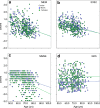
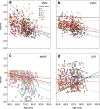
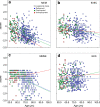
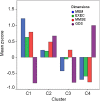
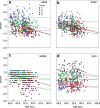
Similar articles
-
Clinical, physical and lifestyle variables and relationship with cognition and mood in aging: a cross-sectional analysis of distinct educational groups.Front Aging Neurosci. 2014 Feb 24;6:21. doi: 10.3389/fnagi.2014.00021. eCollection 2014. Front Aging Neurosci. 2014. PMID: 24605100 Free PMC article.
-
Discriminant power of socio-demographic characteristics and mood in distinguishing cognitive performance clusters in older individuals: a cross-sectional analysis.Aging Ment Health. 2017 May;21(5):537-542. doi: 10.1080/13607863.2015.1128879. Epub 2016 Jan 12. Aging Ment Health. 2017. PMID: 26756965
-
Age-related cognitive decline in patients with mood disorders.Prog Neuropsychopharmacol Biol Psychiatry. 2008 May 15;32(4):962-7. doi: 10.1016/j.pnpbp.2007.12.030. Epub 2008 Jan 11. Prog Neuropsychopharmacol Biol Psychiatry. 2008. PMID: 18243461
-
Cognitive deficits in bipolar disorders: Implications for emotion.Clin Psychol Rev. 2018 Feb;59:126-136. doi: 10.1016/j.cpr.2017.11.006. Epub 2017 Nov 21. Clin Psychol Rev. 2018. PMID: 29195773 Free PMC article. Review.
-
Dehydration influences mood and cognition: a plausible hypothesis?Nutrients. 2011 May;3(5):555-73. doi: 10.3390/nu3050555. Epub 2011 May 10. Nutrients. 2011. PMID: 22254111 Free PMC article. Review.
Cited by
-
Age effects on EEG correlates of the Wisconsin Card Sorting Test.Physiol Rep. 2015 Jul;3(7):e12390. doi: 10.14814/phy2.12390. Physiol Rep. 2015. PMID: 26216431 Free PMC article.
-
Adult Body Height Is a Good Predictor of Different Dimensions of Cognitive Function in Aged Individuals: A Cross-Sectional Study.Front Aging Neurosci. 2016 Sep 16;8:217. doi: 10.3389/fnagi.2016.00217. eCollection 2016. Front Aging Neurosci. 2016. PMID: 27695413 Free PMC article.
-
Clinical, physical and lifestyle variables and relationship with cognition and mood in aging: a cross-sectional analysis of distinct educational groups.Front Aging Neurosci. 2014 Feb 24;6:21. doi: 10.3389/fnagi.2014.00021. eCollection 2014. Front Aging Neurosci. 2014. PMID: 24605100 Free PMC article.
-
Telephone-based screening tools for mild cognitive impairment and dementia in aging studies: a review of validated instruments.Front Aging Neurosci. 2014 Feb 25;6:16. doi: 10.3389/fnagi.2014.00016. eCollection 2014. Front Aging Neurosci. 2014. PMID: 24611046 Free PMC article. Review.
-
Cognition Is Associated With Peripheral Immune Molecules in Healthy Older Adults: A Cross-Sectional Study.Front Immunol. 2020 Sep 2;11:2045. doi: 10.3389/fimmu.2020.02045. eCollection 2020. Front Immunol. 2020. PMID: 32983153 Free PMC article.
References
-
- Ardila A, Ostrosky-Solis F, Rosselli M, Gómez C. Age-related cognitive decline during normal aging: the complex effect of education. Arch Clin Neuropsychol. 2000;15:495–513. - PubMed
Publication types
MeSH terms
LinkOut - more resources
Full Text Sources
Medical
